Your cart is currently empty!
Category: Application Process
-
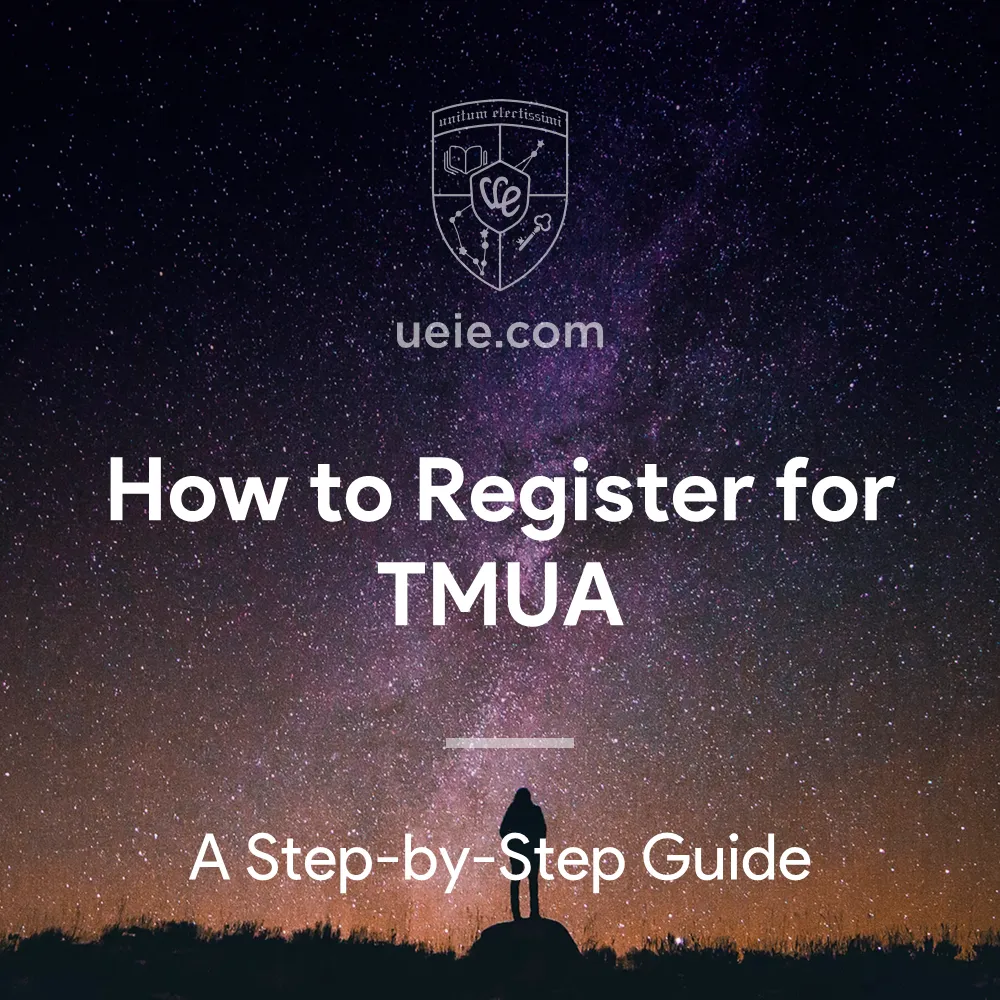
How to Register for TMUA
For students aspiring to read mathematics, computer science, or economics-related degrees at leading UK universities, such as the University of Cambridge and Imperial College London, the Test of Mathematics for University Admission (TMUA) is a vital part of the application process. The TMUA result is a significant factor influencing offers of admission. However, many students and their parents are unacquainted with the particulars of TMUA registration, including the procedures, timelines, and appropriate test session. This article offers a thorough guide to the TMUA registration process, aiming to clarify common uncertainties.
I. TMUA Organisation and Administration
Since 2024, the TMUA has been centrally managed by UAT-UK (University Admissions Tests – UK), a not-for-profit organisation. UAT-UK focuses on university entrance examinations in the United Kingdom and currently oversees two computer-based testing programmes: ESAT and TMUA. Pearson VUE delivers these tests. It is the certification and licensure arm of Pearson, an internationally recognized learning company. With a vast network of over 5,500 test centres across more than 180 countries and territories, Pearson VUE provides professional assessment services to academic and admissions bodies globally.
II. Key Dates for the 2025 TMUA Test
The TMUA has two test sittings, scheduled for October 2025 and January 2026. The pertinent dates are outlined below:
1. October 2025 TMUA Test
31 July 2025 TMUA Registration Opens 29 September 2025 TMUA Registration Closes 13 & 14 October 2025 TMUA Test Dates 14 November 2025 TMUA Results Released 2. January 2026 TMUA Test
27 October 2025 TMUA Registration Opens 19 December 2025 TMUA Registration Closes 8 & 9 January 2026 TMUA Test Dates To Be Confirmed (anticipated within six weeks of the test) TMUA Results Released Important Notes Regarding Test Window Selection:
Applicants to the University of Cambridge must register for and sit the October examination. The January examination is not available to Cambridge applicants.
Specific Date Restriction for Certain Localities:
The University of Cambridge does not permit candidates from mainland China, Hong Kong, and Macau to sit the TMUA examination on 13 October 2025. Therefore, applicants from these localities targeting Cambridge must sit the TMUA examination on 14 October 2025.
III. TMUA Registration Procedure
1. Create a UAT-UK Account
- Candidates must create a UAT-UK account on the official Pearson VUE website. (It is prudent to consult the official UAT-UK website for the latest registration guidance).
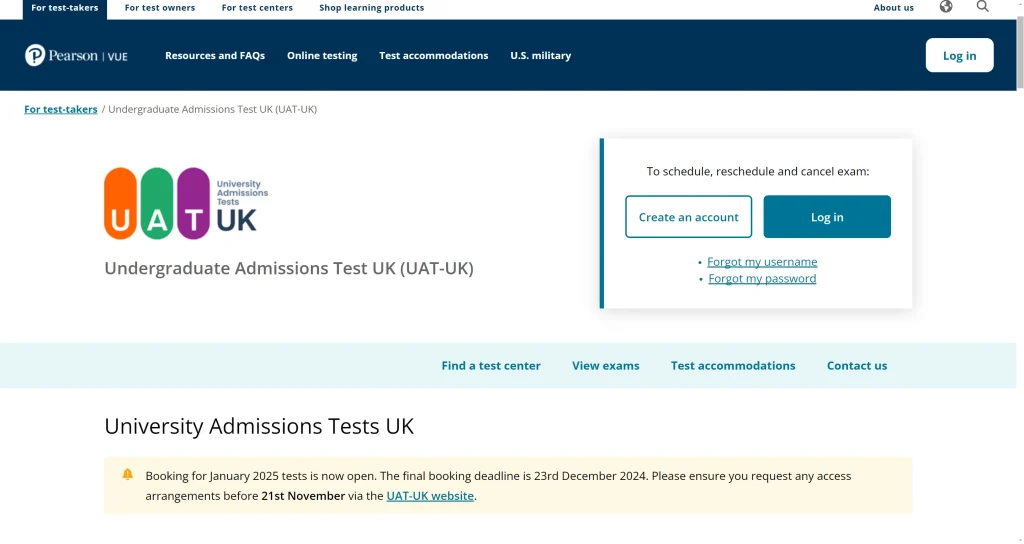
- It is imperative that the name used for UAT-UK account registration precisely matches the name on the candidate’s identification document. Discrepancies may prevent the candidate from sitting the examination. Candidates should also ensure their name matches their UCAS application name.
After creating an account, Pearson VUE will email candidates. This email enables them to confirm details and account settings. Candidates should receive it within 24 hours. This email will also include a temporary password for the candidate’s account.
- Upon receipt of the account confirmation email, candidates may log in using the temporary password, subsequently change their password, and locate their UAT-UK ID (format: UATUK######) in the top left-hand corner of the page navigation bar.
2. Examination Booking
- Log in to your UAT-UK account on the official Pearson VUE website and select the option to book the TMUA examination.
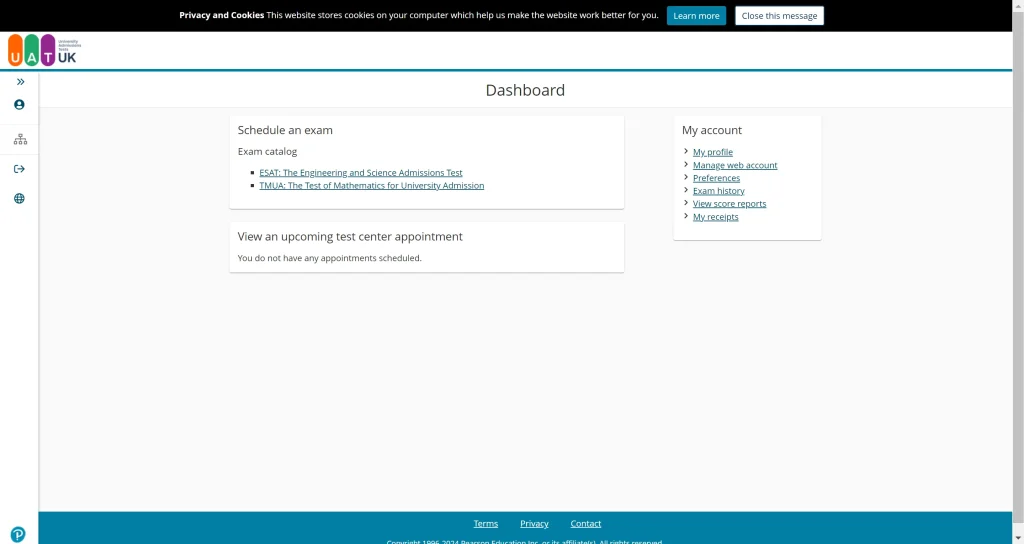
- Provide personal information pertinent to the examination. The system denotes compulsory fields with an asterisk (*).
- Candidates can locate their nearest test centre via the Pearson VUE website to complete their TMUA registration. Please note that sought-after test centres have limited places, especially as the registration deadline approaches. We strongly advise booking well in advance.
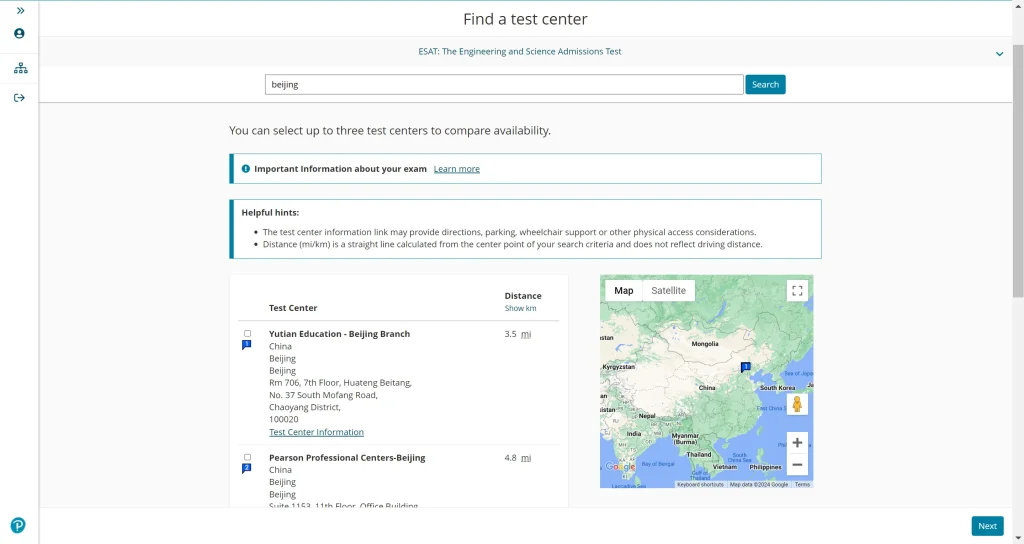
3. Post-Registration and Pre-Examination Steps
- Retain Confirmation Letter: It is strongly recommended that candidates save or print the examination confirmation letter issued by Pearson VUE once registration and payment are complete. This document usually serves as proof of entry for the examination.
- Familiarise Yourself with Test Centre Regulations: Candidates are advised to visit the Pearson VUE website or contact their test centre before the examination to apprise themselves of specific test centre rules and regulations.
- Official Contact Details: For any queries, candidates may contact the Pearson VUE candidate services helpline on 866 892 4788 (toll-free) or liaise with official customer service through the customer service centre on the Pearson VUE website.
4. Examination Fees
- For candidates sitting the TMUA examination outside the UK and the Republic of Ireland (including mainland China), the fee is generally £130.
- For candidates sitting the examination within the UK and the Republic of Ireland, the fee is £75.
IV. Access Arrangements
Candidates requiring access arrangements are advised to register for the examination at the earliest opportunity. Registering later may diminish the likelihood of securing arrangements at the preferred date and test centre. UAT-UK may take up to ten working days to process applications for access arrangements. Furthermore, the deadline for applying for access arrangements is typically in advance of the standard registration deadline. It is essential to check and submit such applications with ample time.
All applications for access arrangements must be substantiated by evidence from a medical practitioner or specialist teacher, clearly detailing the candidate’s disability, medical condition, or other relevant circumstances.
Types of access arrangements that necessitate application and approval include:
- 25% extra time
- Supervised rest breaks
- Separate invigilation (rooming)
- Use of a coloured reading overlay or bookmark
- A reader or scribe
- Other (please supply specific details of any aids or modifications required)
V. Cancelling TMUA Registration
- Candidates may cancel or amend their examination booking up to 48 hours prior to the scheduled test without penalty.
- Cancellations or amendments must be effected by logging into the Pearson VUE website account or by contacting customer services for assistance.
- Should a candidate fail to cancel or amend their booking in good time, or fail to attend the examination, the examination fee will be forfeit.
- It is important to appreciate that the TMUA examination is conducted over only two days. The feasibility of successfully rescheduling an examination date is dependent upon availability at the selected test centre.
- The precise cancellation and amendment policy will be as per the terms and conditions stipulated by Pearson VUE at the point of booking.
VI. Concluding Thoughts
In the competitive arena of applications for mathematics, computer science, and economics-related courses at Cambridge and other UK universities, a thorough grasp not only of TMUA test content and preparatory techniques but also of the nuances of the registration procedure is essential for a trouble-free application process.
You may also find it beneficial to peruse our related articles, which offer a comprehensive analysis of the TMUA examination and a study guide designed to augment your preparation and effectively enhance your TMUA score. Please click the link below.
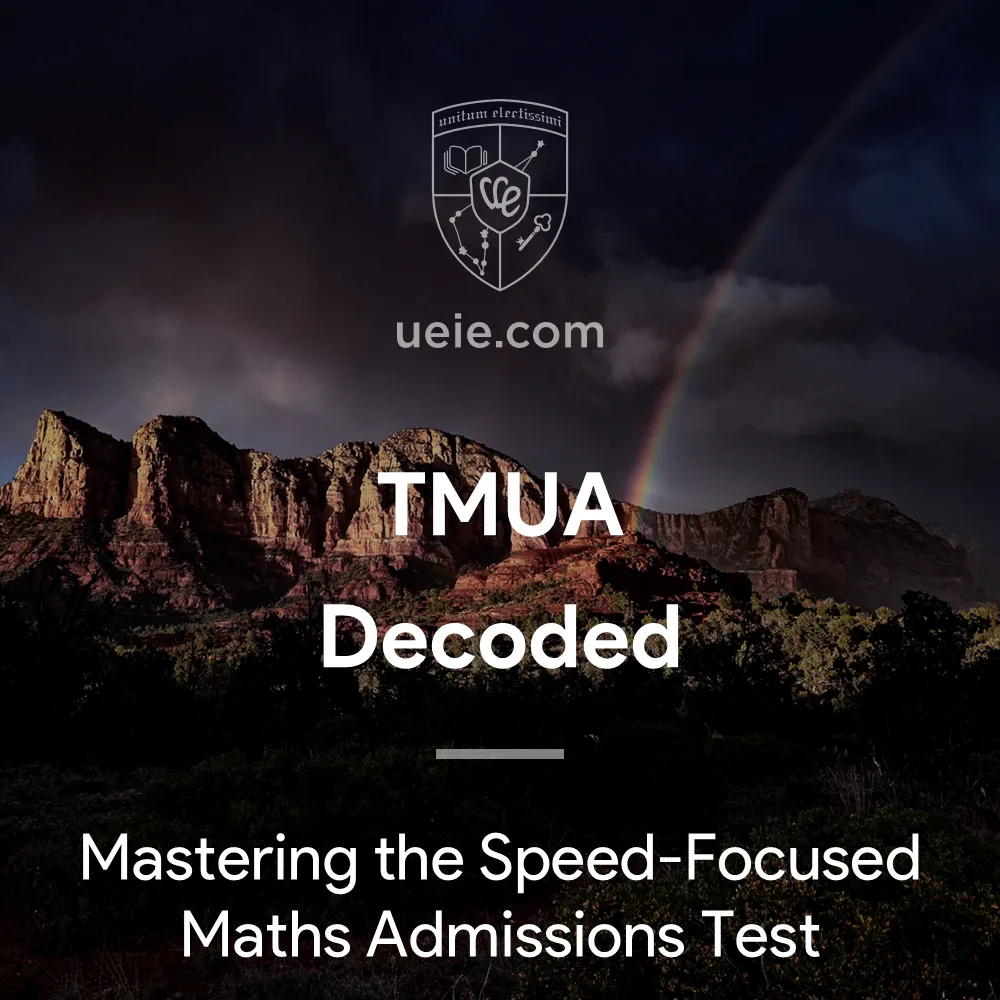
TMUA Decoded: Mastering the Speed-Focused Maths Admissions Test
Applying for Maths, CS, or Econ at Cambridge, Imperial, LSE? Understand the TMUA test (Test of Mathematics for University Admission), managed by UAT-UK. This guide covers the online format, syllabus, 9-point scoring, key dates, and speed/accuracy focus.
Conquer the TMUA: Speed & Accuracy Training for Top Maths Scores
Aiming for a high score in the speed-focused TMUA test? This guide provides core strategies for effective preparation, focusing on enhancing calculation speed & accuracy (no calculator), developing logical agility, mastering MCQ techniques, and resource planning. - Candidates must create a UAT-UK account on the official Pearson VUE website. (It is prudent to consult the official UAT-UK website for the latest registration guidance).
-
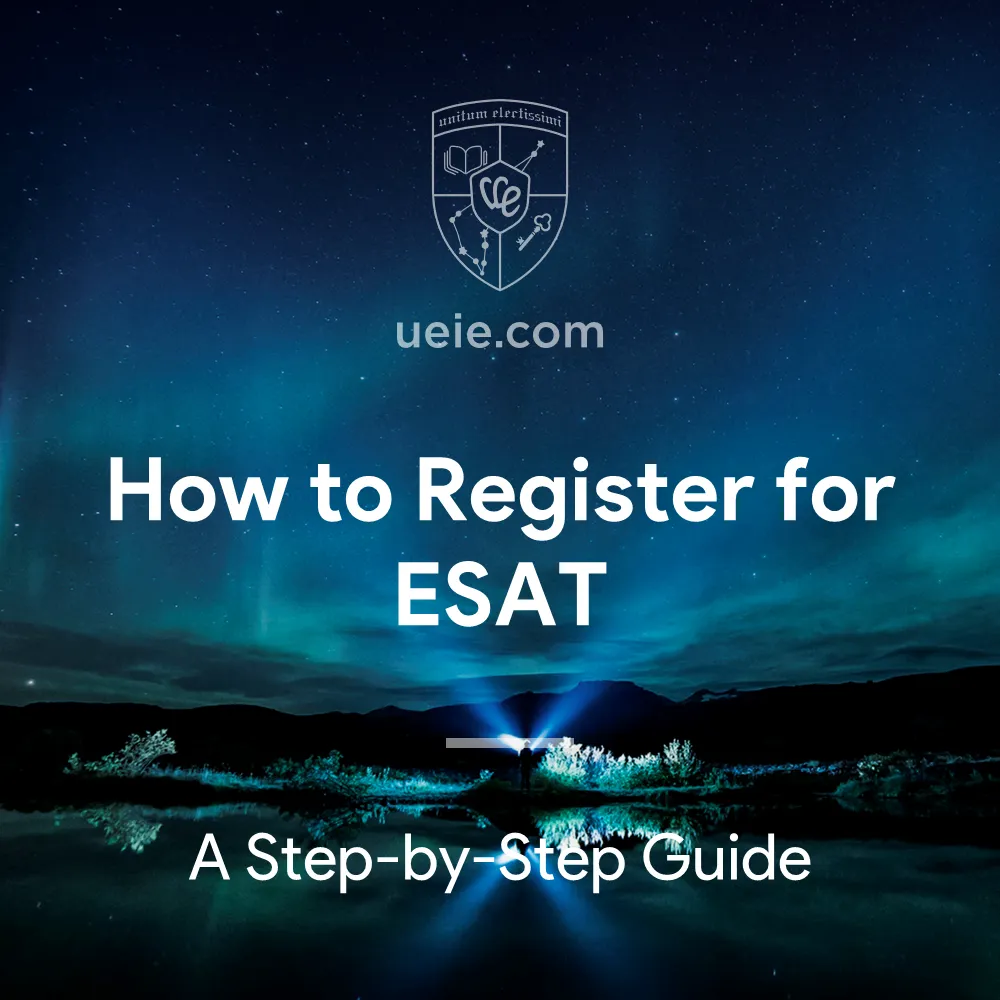
How to Register for ESAT
For students aspiring to read engineering or natural sciences at the University of Cambridge or Imperial College London, the Engineering and Science Admissions Test (ESAT) result is a key determinant of their ultimate success in gaining admission. However, many students and their parents are unacquainted with the particulars of ESAT registration, such as the procedures for enrolment, the pertinent timelines, and the appropriate examination session for which to register. This article will, therefore, provide a detailed exposition and guidance on the various processes and facets of ESAT registration, aiming to elucidate these matters and resolve any uncertainties.
I. ESAT Organisation and Administration
Since 2024, the ESAT has been centrally managed by UAT-UK (University Admissions Tests – UK), a not-for-profit organisation. UAT-UK focuses on university entrance examinations in the United Kingdom and currently oversees two computer-based testing programmes: ESAT and TMUA. Pearson VUE delivers these tests. It is the certification and licensure arm of Pearson, an internationally recognized learning company. With a vast network of over 5,500 test centres across more than 180 countries and territories, Pearson VUE provides professional assessment services to academic and admissions bodies globally.
II. Key Dates for the 2025 ESAT Examinations
The ESAT has two examination sittings, scheduled for October 2025 and January 2026. The pertinent dates are outlined below:
1. October 2025 ESAT Examination
31 July 2025 ESAT Registration Opens 29 September 2025 ESAT Registration Closes 9 & 10 October 2025 ESAT Test Dates 14 November 2025 ESAT Results Released 2. January 2026 ESAT Examination
27 October 2025 ESAT Registration Opens 19 December 2025 ESAT Registration Closes 6 & 7 January 2026 ESAT Test Dates To Be Confirmed (anticipated within six weeks of the test) ESAT Results Released Important Notes Regarding Test Window Selection:
Applicants to the University of Cambridge must register for and sit the October examination. The January examination is not available to Cambridge applicants.
Specific Date Restriction for Certain Localities:
The University of Cambridge does not permit candidates from mainland China, Hong Kong, and Macau to sit the ESAT examination on 9 October 2025. Therefore, applicants from these localities targeting Cambridge must sit the ESAT examination on 10 October 2025.
III. ESAT Registration Procedure
1. Create a UAT-UK Account
1. Candidates must create a UAT-UK account on the official Pearson VUE website. (It is prudent to consult the official UAT-UK website for the latest registration guidance).

2. It is imperative that the name used for UAT-UK account registration precisely matches the name on the candidate’s identification document. Discrepancies may prevent the candidate from sitting the examination. Candidates should also ensure their name matches their UCAS application name.
3. After creating an account, Pearson VUE will email candidates. This email enables them to confirm details and account settings. Candidates should receive it within 24 hours. This email will also include a temporary password for the candidate’s account.
4. Upon receipt of the account confirmation email, candidates may log in using the temporary password, subsequently change their password, and locate their UAT-UK ID (format: UATUK######) in the top left-hand corner of the page navigation bar.
2. Examination Booking
1. Log in to your UAT-UK account on the official Pearson VUE website and select the option to book the ESAT examination.

2. The ESAT examination comprises five sections. Typically, all candidates are required to sit the Mathematics 1 module. In addition to this, candidates will generally need to select two further modules from Mathematics 2, Physics, Chemistry, and Biology, in accordance with the requirements of their chosen university and specific programme of study. It is imperative that candidates meticulously consult the official admissions webpage of their prospective institution to confirm the precise subject combination stipulated for their intended course. Selecting an appropriate combination of subjects is likely to strengthen your university application.
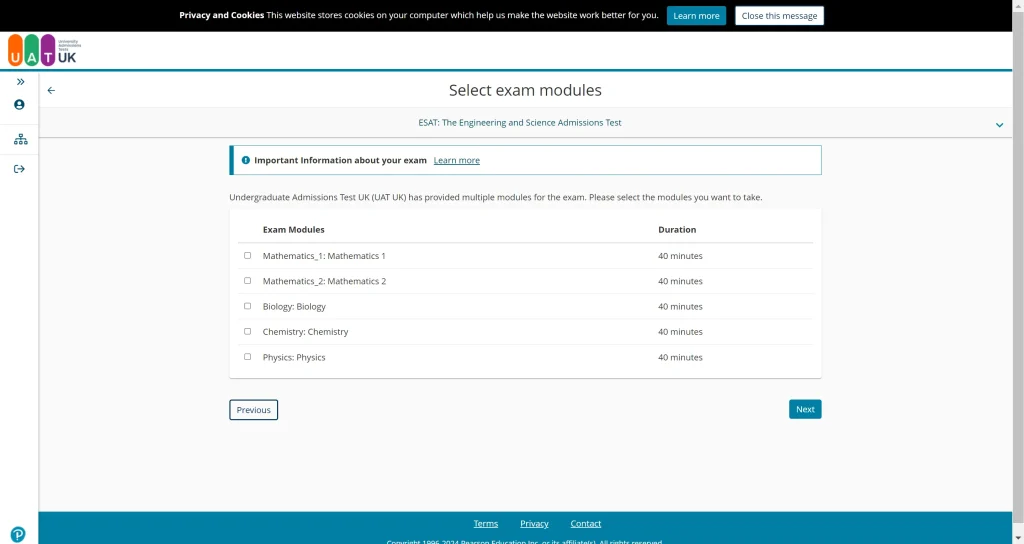
3. Provide personal information pertinent to the examination. The system denotes compulsory fields with an asterisk (*).
4. Candidates can locate their nearest test centre via the Pearson VUE website to complete their ESAT registration. Please note that sought-after test centres have limited places, especially as the registration deadline approaches. We strongly advise booking well in advance.

3. Post-Registration and Pre-Examination Steps
- Retain Confirmation Letter: It is strongly recommended that candidates save or print the examination confirmation letter issued by Pearson VUE once registration and payment are complete. This document usually serves as proof of entry for the examination.
- Familiarise Yourself with Test Centre Regulations: Candidates are advised to visit the Pearson VUE website or contact their test centre before the examination to apprise themselves of specific test centre rules and regulations.
- Official Contact Details: For any queries, candidates may contact the Pearson VUE candidate services helpline on 866 892 4788 (toll-free) or liaise with official customer service through the customer service centre on the Pearson VUE website.
4. Examination Fees
- For candidates sitting the ESAT examination outside the UK and the Republic of Ireland (including mainland China), the fee is generally £130.
- For candidates sitting the examination within the UK and the Republic of Ireland, the fee is £75.
IV. Access Arrangements
Candidates requiring access arrangements are advised to register for the examination at the earliest opportunity. Registering later may diminish the likelihood of securing arrangements at the preferred date and test centre. UAT-UK may take up to ten working days to process applications for access arrangements. Furthermore, the deadline for applying for access arrangements is typically in advance of the standard registration deadline. It is essential to check and submit such applications with ample time.
All applications for access arrangements must be substantiated by evidence from a medical practitioner or specialist teacher, clearly detailing the candidate’s disability, medical condition, or other relevant circumstances.
Types of access arrangements that necessitate application and approval include:
- 25% extra time
- Supervised rest breaks
- Separate invigilation (rooming)
- Use of a coloured reading overlay or bookmark
- A reader or scribe
- Other (please supply specific details of any aids or modifications required)
V. Cancelling ESAT Registration
- Candidates may cancel or amend their examination booking up to 48 hours prior to the scheduled test without penalty.
- Cancellations or amendments must be effected by logging into the Pearson VUE website account or by contacting customer services for assistance.
- Should a candidate fail to cancel or amend their booking in good time, or fail to attend the examination, the examination fee will be forfeit.
- It is important to appreciate that the ESAT examination is conducted over only two days. The feasibility of successfully rescheduling an examination date is dependent upon availability at the selected test centre.
- The precise cancellation and amendment policy will be as per the terms and conditions stipulated by Pearson VUE at the point of booking.
VI. Concluding Thoughts
As the 2025 ESAT examinations draw nearer, it remains of paramount importance for all students intending to apply for engineering and natural sciences programmes at the University of Cambridge and Imperial College London to acquaint themselves promptly with the latest examination updates and to familiarise themselves thoroughly with the complete ESAT registration procedure. Kindly make full use of this guide to prepare effectively for successful matriculation at your chosen institution.
Should you wish to explore further aspects of the ESAT examination, such as a comprehensive overview of test information, guidance on structuring your preparation timeline, and effective study strategies, you may also consult our other articles by clicking the link provided below.
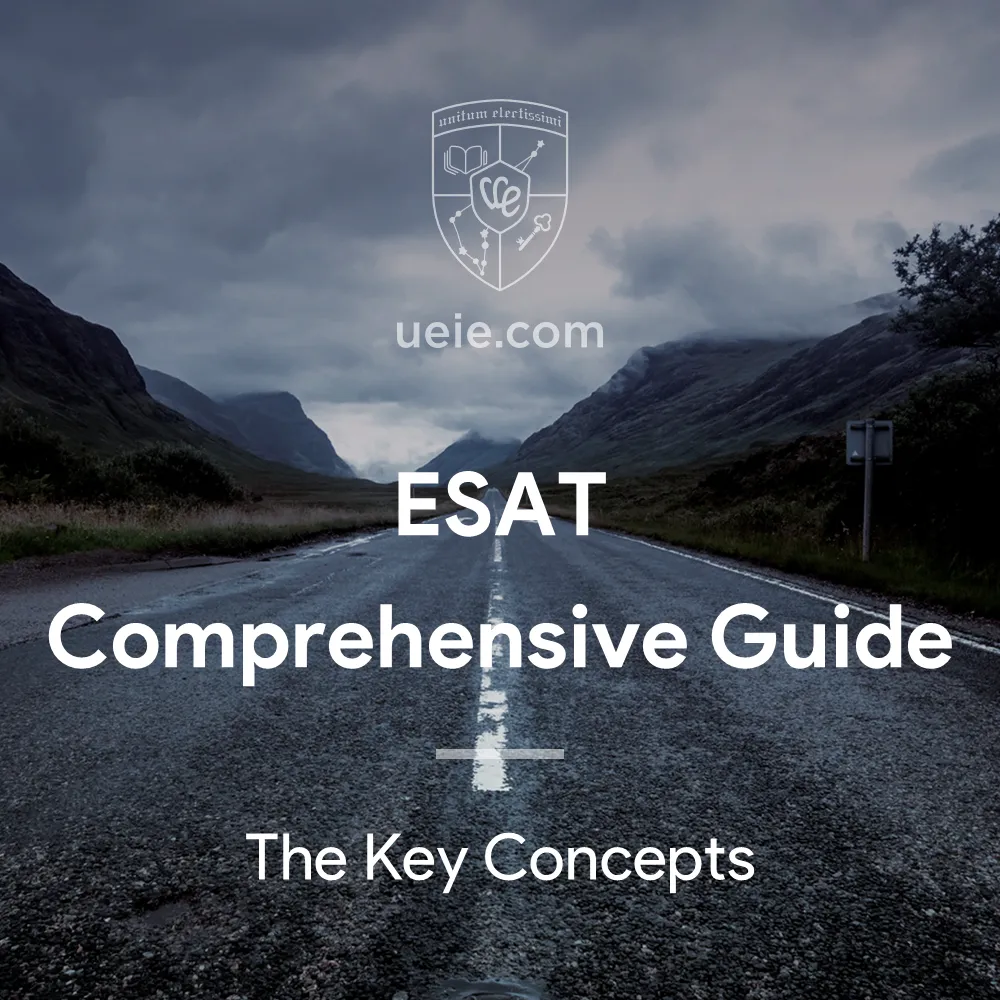
ESAT Explained: Navigating the Modular Test for Science & Engineering
Applying for Science or Engineering at Cambridge, Imperial, UCL? Learn about the ESAT test (Engineering and Science Admissions Test). This guide explains the modular structure (choose 3 of 5), online format, syllabus basics, scoring, and crucial no-calculator rule.
Conquer the ESAT: Multi-Subject Strategies for Online Test Success
Conquer the ESAT test required for top Science & Engineering courses. This guide offers strategies for multi-subject preparation (Maths, Physics, Chem, Bio), mastering the online format, enhancing speed & accuracy without a calculator, and effective resource use. -

Choose Oxford College Wisely

“Your journey to Oxford begins with choosing the right college – the key to unlocking a world of opportunities.”
I. Understanding the Operations of the Oxford College System
The Oxford College gadget is unique, comprising 39 impartial and numerous colleges. Each university has its traditions, facilities, and atmosphere. Here’s what you want to know:
- Colleges provide accommodation, dining, and academic support.
- Students belong to both their college and their academic department.
- Tutors oversee academic progress and offer personalized guidance.
- Inter-college events and competitions foster a sense of community.
II. Exploring Oxford’s 32 Colleges: Finding Your Perfect Match
Choosing the proper university at Oxford can be like locating the appropriate treasure in a big, mysterious cave! But worry not, adventurers! Let’s have a quick understanding and familiarity with the 32 colleges of Oxford University that enroll undergraduate students:
- Balliol College
- Brasenose College
- Christ Church
- Corpus Christi College
- Exeter College
- Harris Manchester College
- Hertford College
- Jesus College
- Keble College
- Lady Margaret Hall
- Lincoln College
- Magdalen College
- Mansfield College
- Merton College
- New College
- Oriel College
- Pembroke College
- The Queen’s College
- Regent’s Park College
- St John’s College
- St Anne’s College
- St Catherine’s College
- St Edmund Hall
- St Hilda’s College
- St Hugh’s College
- St Peter’s College
- Somerville College
- Trinity College
- University of Oxford College
- Wadham College
- Worcester College
- Wycliffe Hall
There are remarkable variations among the colleges at Oxford University. Each college has its specific history, architecture, size, culture, and traditions. Some colleges are massive and bustling with activity, at the same time as others are smaller and provide an extra intimate network atmosphere. Additionally, a few colleges are housed in anciental homes relationship returned centuries, at the same time as others are extra cutting-edge in design.
Certain colleges may have strengths in specific subjects or offer specialized facilities or programs. The availability of resources, such as libraries, research centers, and extracurricular activities, may also vary among colleges.
In terms of extracurricular activities, each college has unique or specialized traditional activities that enhance students’ sense of belonging and closeness, and influence their satisfaction and identification with the college.
Overall, at the same time as all colleges at Oxford provide a world-magnificence education, the variations amongst them permit college students to discover a college that exceptionally suits their character preferences, interests, and educational goals.
III. Determining Your College Preferences: What Factors Do I Need to Consider?
1. Check the academic strength of each college through the Norrington Table
The Norrington score, developed by Sir Arthur Norrington, former President of Trinity, in the 1960s, provides a way of measuring the performance of students at each college in finals. The Norrington score is based on the classifications of undergraduate degrees awarded and expressed as a percentage. lt is calculated by attaching a score of 5 to a 1st class degree, 3 to a 2:1 degree, 2 to a 2:2 degree, 1 to a 3rd class degree and 0 to a pass and Honours Pass. The percentage expressed is calculated by dividing the total college score by the total possible score the college could attain (ie number of degrees awarded per college x score of 5).
The Norrington rankings do not fully represent college teaching standards. However, they do provide some indication of student qualifications, resident professors, and the learning atmosphere at each college.
The following table shows the Norrington scores and rankings of each college in 2021/22:
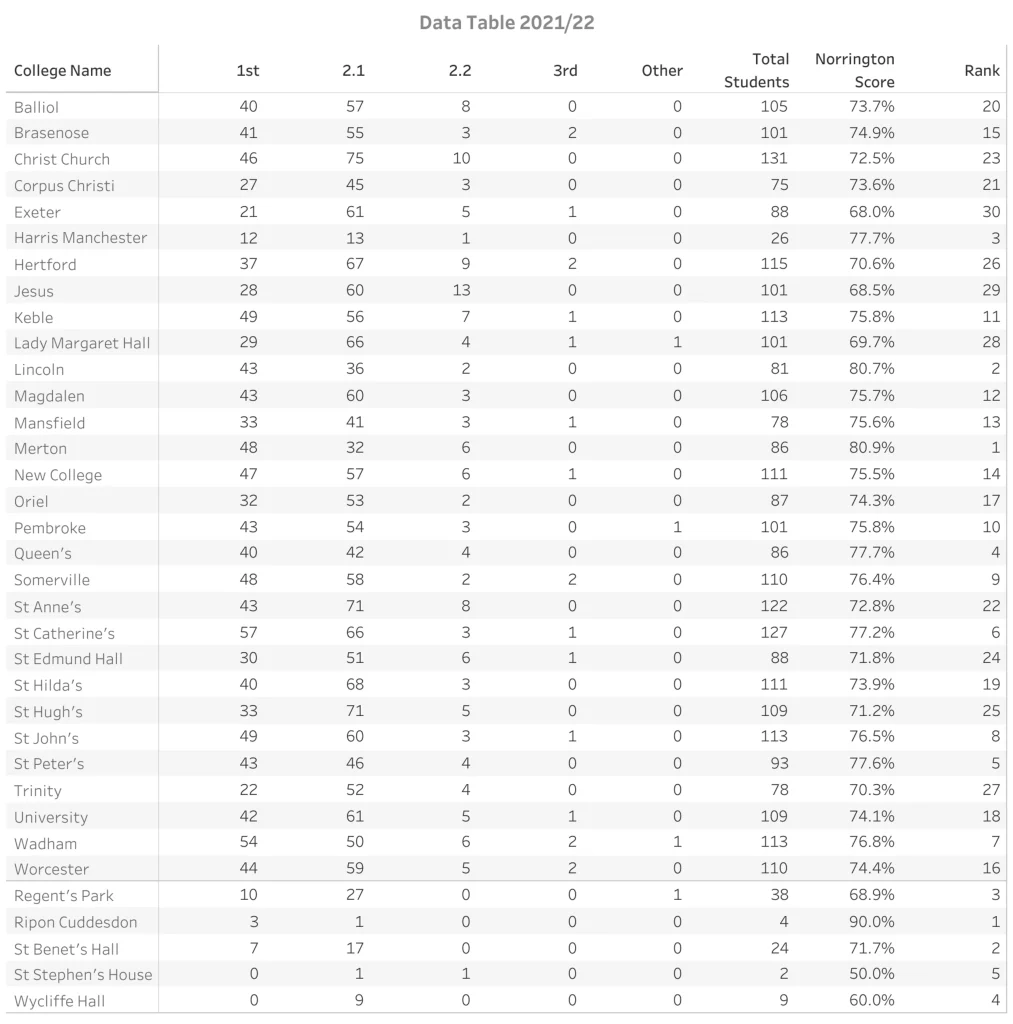
More detailed information can be found on the official website of the University of Oxford.
2. Which Oxford colleges offer my course?
The colleges of the University of Oxford do not specialize in specific courses, and most of them can meet the needs of different students. But some colleges do perform strongly in certain courses:
For example, Balliol College is strong in social science; Brasenose College is famous for PPE and law; Corpus Christi College is excellent in medicine, English, and other courses; and Jesus College has overall academic strength, especially outstanding in physics, chemistry, and engineering.
To explore more course information, you can also check the official website of the University of Oxford.
3. Student Composition and Admission Data
Oxford University has seen an increase in the number of international students admitted in recent years. However, it still primarily admits students from the United Kingdom and European countries. It is essential to understand the admission status of each college in advance when making a college choice.
The table below displays the countries and regions with the highest number of applicants to Oxford University and the data on students admitted to the university between 2020 and 2022.
For more detailed information, please refer to the ANNUAL ADMISSIONS STATISTICAL REPORT (2023 Edition).
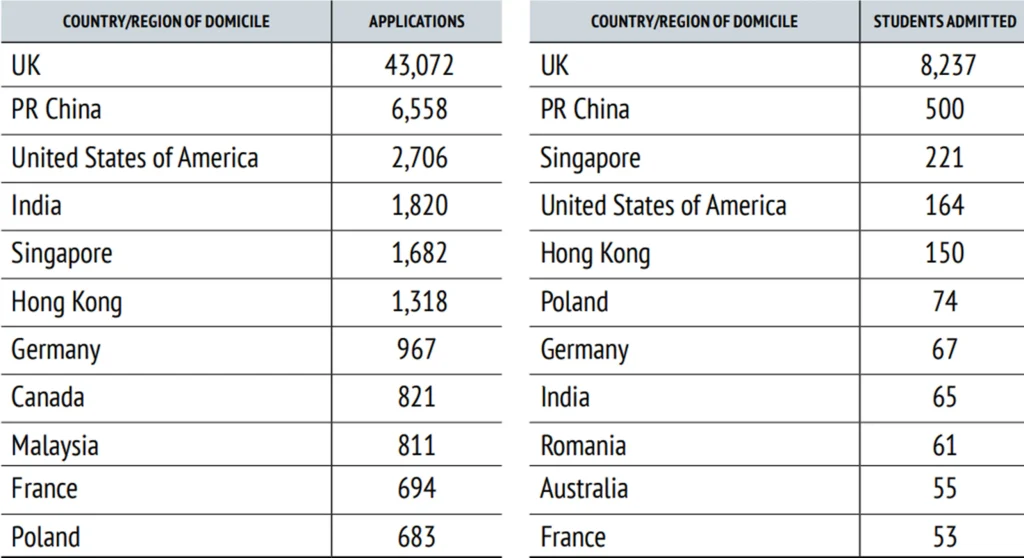
4. What kind of clubs and activities does each college offer?
Life in Oxford is exciting and fun. In addition to each college community, you can explore your interests in more than 400 clubs and societies.
Each college has a wide range of activities, from news broadcasting, music, drama, art, sports, and voluntary activities, ensuring that every student can have fun.
Participating in club activities is not only fun. It enriches social life, improves students’ various skills, and maintains a positive and good state in life and study, thereby achieving their academic goals.
5. Location of the college and distance between facilities
Each college is scattered throughout the city. Some are closer to the school’s science area and exam boards, making it more convenient for classes and exams; some are closer to the city center, making it easier for students to explore outside of the classroom and navigate the city; and some are a little farther out of the town, but much larger, with quiet, beautiful gardens to view.
If you want to view each college’s specific location and surrounding facilities in detail, please check the map on each college website on the official website of the University of Oxford.
IV. Which is the best college under Oxford?
If you’re seeking an enriching academic environment steeped in history, personalized guidance from esteemed faculty, access to world-renowned libraries, and an esteemed collegiate experience, then adding Oxford to your wish list is a must. The university’s rich legacy as the oldest English-speaking institution has seen it nurture countless Nobel laureates, influential political figures, and prominent historical personalities.
Oxford’s tutorial teaching approach is renowned for its effectiveness. Large lecture halls are a rarity, as students engage in small-group discussions or one-on-one sessions with experts in their chosen fields, fostering an unparalleled learning experience.
At Oxford, selecting a college is not about finding the ‘best’ one, but rather discovering the unique characteristics that suit you best! Each college has its own distinct features, such as the grandeur of its historic buildings, the intimacy of its smaller community, or the innovative programs it offers.
V. Which college should I choose if I want a higher possibility of getting an offer?
All colleges are equal when it comes to getting an offer. Don’t worry too much about that! Focus on finding a college where you’ll be happy and thrive.
What if I get rejected from my preferred college? Do I still have any opportunity to get an offer from other colleges?
No worries! If you don’t get an offer from your first-choice college but you are a strong candidate, other colleges might still welcome you with open arms. They’re all part of the big Oxford family and want the best for you!
VI. Choosing the Right Fit for Your Application Journey—UEIE’s Advantages
UEIE focuses on Oxbridge Planning, Oxbridge-Prep, and Olympiad-Prep and has gradually accumulated more than 40 exclusive quality courses, more than 500 video lectures, 100+ students admitted to Oxbridge G5 Ivy League schools, and 8000+ registered users.
At UEIE, we provide personalized guidance, extensive experience, and complete assistance with overseas applications. We’ll help you craft a perfect Personal Statement, deliver a highly competitive Admissions Test score, and teach you how to interview effectively. Our services cater to every aspect of your application to Oxford University, from History to Medicine.
Choosing the perfect college at Oxford University feels like finding the missing puzzle piece. But fear not! With some guidance, you’ll discover the ideal fit for your academic adventure.
Unlock the potential of our Oxbridge Premium Programs by scheduling your free consultation or enrolling now to triple your chances of success.
VII. What advice is offered to students exploring Oxford’s colleges?
Choosing your Oxford college is like selecting your Hogwarts house – it’s about finding where you belong! Remember to explore the magic and wonder of each college in Oxford. Take your time to explore your options, trust your instincts, and find the college that feels like home to you.
With UEIE supporting you, no matter which college you choose, your experience at Oxford University could be magical and extraordinary!
-

Choose Cambridge College Wisely

If you’re seeking personalized guidance from esteemed faculty and world-class university life, adding Cambridge to your wish list is a must. However, how to choose one college that suits you best at the University of Cambridge? Here, we’ll explain what colleges are and what you should keep in mind as you fill out their applications. Embark on a journey!
I. Understanding the Operations of the Cambridge College System
As a collegiate university, Cambridge comprises Colleges, Schools, Faculties, and Departments. It includes 31 semi-autonomous constituent colleges and over 150 academic departments, faculties, and other institutions. Member colleges enjoy a high degree of autonomy and are semi-independent institutions. They have their own governance framework, student recruitment, and student activities.
1. Colleges at the University of Cambridge
The colleges’ importance lies in the housing, welfare, social functions, and undergraduate teaching they provide.
When studying at Cambridge, you’ll get the most out of what the college offers regarding facilities. Even though you are far from home, your College can be your comfy nest. Also, you will find many opportunities to mingle with previous students from various colleges in your vicinity, plus you can join all kinds of University-wide societies and clubs. Sounds great, doesn’t it?
2. 29 colleges accepting undergraduate students:
- Christ’s College
- Churchill College
- Clare College
- Corpus Christi College
- Downing College
- Emmanuel College
- Fitzwilliam College
- Girton College
- Gonville & Caius College
- Homerton College
- Hughes Hall (mature students only)
- Jesus College
- King’s College
- Lucy Cavendish College
- Magdalene College
- Murray Edwards College (female students only)
- Newnham College (female students only)
- Pembroke College
- Peterhouse
- Queens’ College
- Robinson College
- Selwyn College
- Sydney Sussex College
- St Catharine’s College
- St Edmund’s College (mature students only)
- St John’s College
- Trinity College
- Trinity Hall
- Wolfson College (mature students only)
3. Schools at the University of Cambridge
Schools at the University of Cambridge are a broad administrative grouping of related faculties and other units. Each has an elected supervisory body known as a Council, composed of representatives of the various constituent bodies. The University of Cambridge maintains six such schools:
- Arts and Humanities
- Biological Sciences
- Clinical Medicine
- Humanities and Social Sciences
- Physical Sciences
- Technology
4. Faculties and Departments at the University of Cambridge
The faculties of the University of Cambridge are based on more detailed classifications of academic fields. They are responsible for integrating the teaching and research affairs of the departments to which they belong, while the departments directly carry out the teaching and research affairs.
II. Do Certain Colleges Excel in Specific Courses?
The University of Cambridge, which offers over 30 undergraduate courses covering over 65 subject areas, is renowned for its specialized approach to education. Colleges’ histories and cultures strengthen specific strengths in particular areas, creating an atmosphere where certain disciplines thrive and excel.
- For example, Trinity College is one of the most prestigious colleges in Cambridge. In terms of arithmetic and science, it’s a powerhouse. Isaac Newton was among the many eminent mathematicians produced by the university. As you walk through its corridors, you cannot help but feel the mathematical magic all around you.
- The humanities are a strong focus at St. John’s College, another great institution. Languages, literature, and records discover a unique area here. University environments foster a deep appreciation for the arts, encouraging college students to express their creativity in various ways.
- Lastly, there’s King’s College, which is renowned not only for its chapel but also for its lively music scene. Students interested in music, art, and drama find a nurturing ground to hone their skills in this area of creativity and way of life.
The colleges of the University of Cambridge all cover a wide range of courses in different academic fields. Still, there are also cases where some colleges do not offer specific courses.
Meanwhile, each of those colleges contributes to the rich educational tapestry of Cambridge University in its unique way. At Cambridge, there’s a university for every student, whether you’re interested in maths, records, or art. Finding the one that resonates most with your educational interests and aspirations is the key.
Does your preferred college offer the course of your choice? You can check it out on the Cambridge’s official website.
III. Selecting Between Cambridge Colleges: A Guide for Decision-Making
The following tips can help you select a Cambridge College:
The Tompkins Table:
The Tompkins Table is a yearly ranking report of the Colleges of the University of Cambridge in order of their undergraduate students’ performances in that year’s examinations. Peter Tompkins, a third-year undergraduate mathematics student at Trinity College, created the table in 1981.
The table allocates 5 points for a First Class degree, 3 points for an Upper Second (also known as a 2. i), 2 points for a Lower Second (a 2. ii), 1 point for a Third and no points for someone only granted an allowance towards an Ordinary Degree. The result is expressed as a percentage of the total points available.
The scores in each subject are then weighted to a common average to avoid the bias toward colleges with higher proportions of students entered for subjects that receive higher average grades.
It should be noted that the University of Cambridge does not officially endorse the rankings. Still, it has become a reference standard for measuring the academic strength of Cambridge University colleges.
The table below shows the ranking of colleges at Cambridge University in 2022:
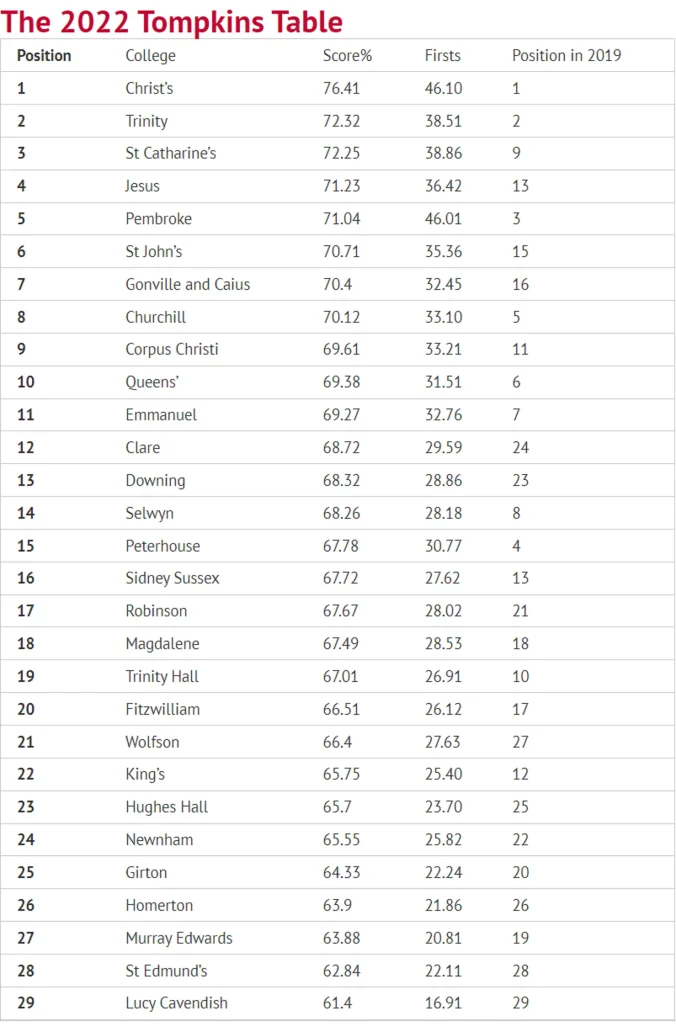
Take your age into consideration:
Hughes Hall, St Edmund’s College and Wolfson College specialize in serving students at least 21 years old and have centers designed specifically for them.
Analyze the size of the university:
Take a look at the number of college students enrolled. For example, Corpus Christi College is one of the smallest colleges at the University of Cambridge, enrolling only about 85 students each year, so there is a close relationship between students of different grades. Meanwhile, Homerton College usually has the largest number of students in Cambridge, and the college atmosphere is more enthusiastic, with more extracurricular activities.
Examine lodging options:
Check if motels are available on-site or at College-owned homes. Some colleges have accommodations in century-old buildings with beautiful views and close proximity to the city center and university facilities, while others have more modern accommodations with heating, laundry and kitchen facilities for a more comfortable living experience.
Check out the different activities:
Each college offers a wide range of activities, from news broadcasting to music, drama, art, sports, and volunteer opportunities, to ensure that every student has something fun to do.
Check the admission statistics:
It is essential to understand the admission status of each college in advance when making a college choice.
- The table below shows the applications from outside the UK.
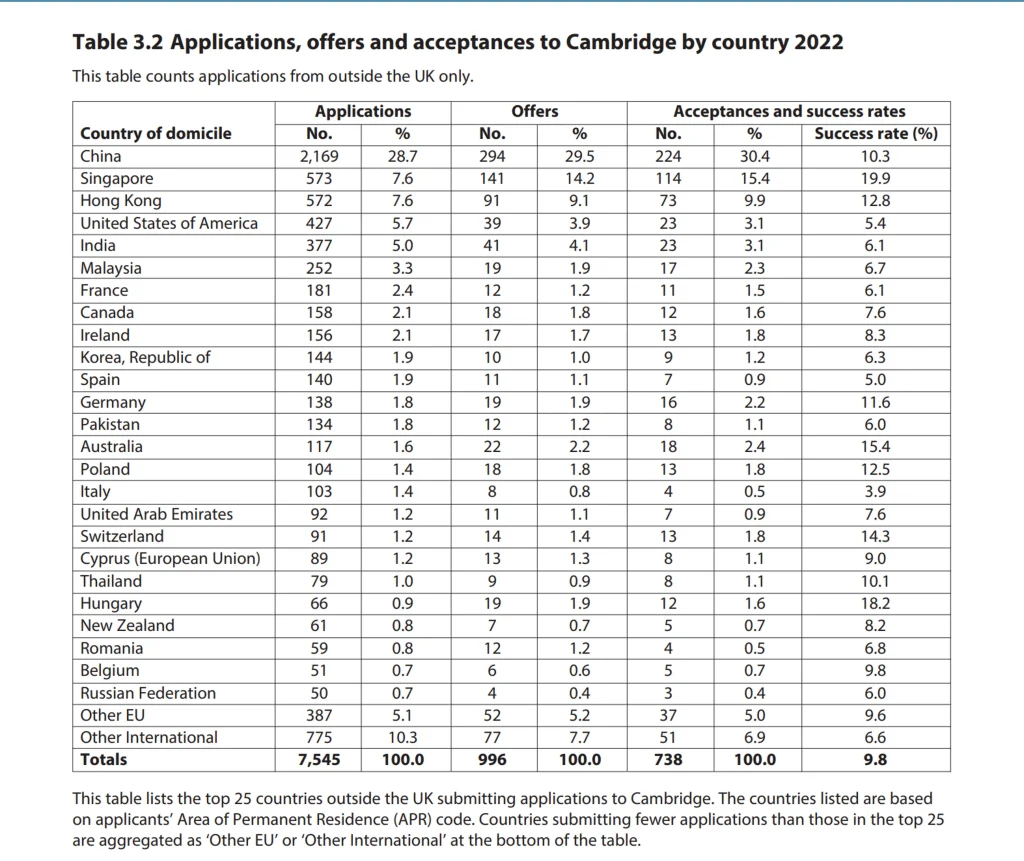
- The table below shows the admission statistics by gender and College in 2022.
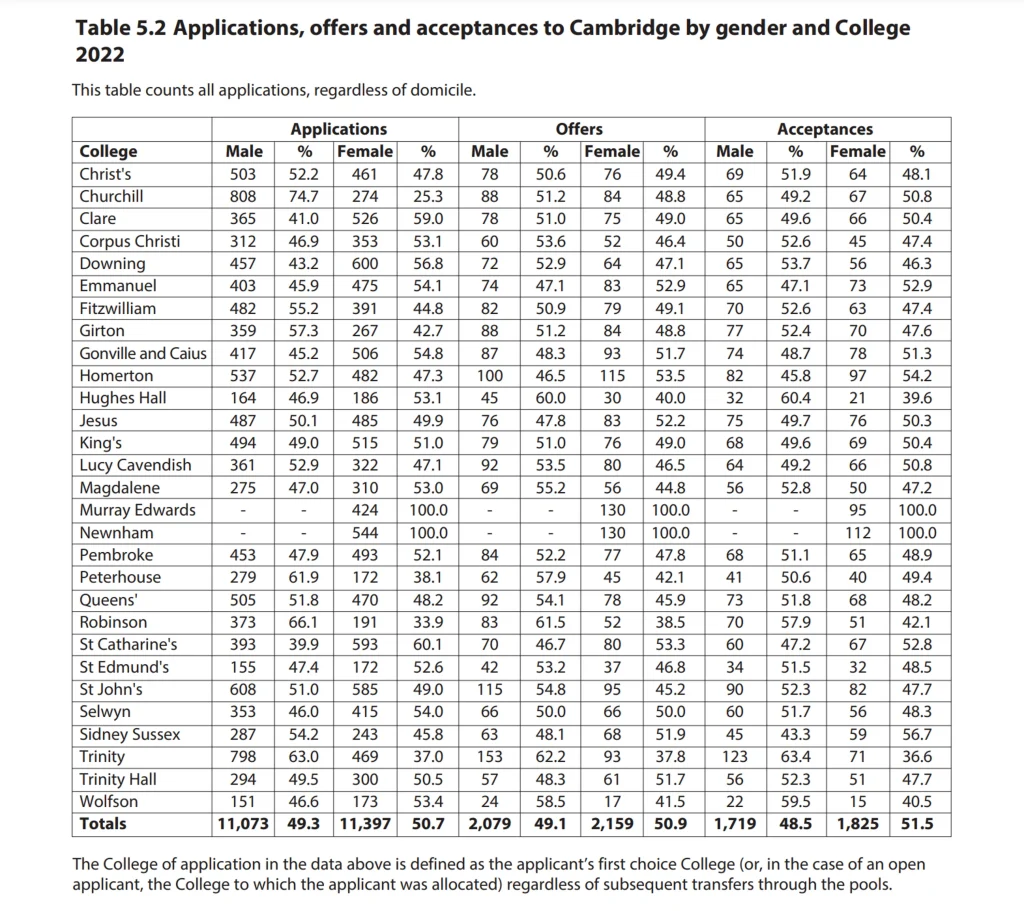
More information can be found on the Cambridge website.
IV. Avoiding College Decision Pitfalls: How Not to Choose a College
Application difficulty: Applying to a less renowned college may not increase your chances of acceptance.
Traveling time: With Cambridge’s compact dimensions, it is possible to travel between campuses on foot, by bike, or by bus.
Age of the College: A college’s age is only sometimes a factor in how students enjoy themselves; all colleges offer anticipated centers and assist with particular traditions.
Previous contact with a college: Contacts with a college in the past may not affect your application or recognition chances.
V. Does it matter which College you go to Cambridge?
While all colleges at Cambridge operate similarly, there are some differences in academic traditions, locations, and aesthetics.
However, whether you have a preference for tradition or atmosphere in a specific college, or you don’t care which college you attend, you can expect a world-class education and university life at Cambridge University.
VI. Can I change my College preferences?
You are able to change your choice of College preferences up to the point of receiving a conditional offer of admission to the University. You can only request a change once.
VII. What are the differences in admission requirements between colleges?
Admission requirements may vary slightly from college to college depending on the year of entry, the course applied for, the nationality of the applicant, etc. However, Cambridge University provides the minimum application criteria for students’ reference. Check the Cambridge University website for each college’s specific entry requirements.
VIII. Which is the best college under Cambridge?
If you ask which is the best college at Cambridge University, some people might say Trinity College because it is one of the largest and most prestigious colleges in Cambridge; some might say King’s College because it is famous for its strong academic strength and has educated many outstanding scientists and innovators; others might say St. John’s College because it is one of the oldest colleges in Cambridge and not only has top academic rankings but also has a wealth of cultural and artistic activities.
However, each college has its own traditions, cultures, and atmosphere. Choosing a college at Cambridge is not about finding the best one but rather discovering the unique characteristics that suit you best.
IX. What is The Pool in the University of Cambridge
Cambridge wants to ensure that the best applicants are offered a place each year, no matter which college they originally applied to or were allocated to. If one college is impressed by you but doesn’t have a place for you, the Pool will play its part.
If you are an impressive applicant, your first choice college may put your application forward for consideration by other colleges. Colleges would rather admit a strong applicant who applied to another College than a weaker applicant who applied directly or was allocated to them.
The processes of the Pool are:
- look at applications that were assessed by another College first
- consider these applicants for courses where they have places left
- make offers to the best applicants
The Pools at the University of Cambridge are:
Winter Pool
If you made an application in October and were interviewed in December, your application may be put forward to be considered by other Colleges in January. A few applicants in the winter pool may be invited to attend another interview in January.
Cambridge will notify you of their decision when all applications have been reviewed. If no College can offer you a place, your first choice College will let you know the decision by the end of January.
Summer Pool
In August, Colleges will consider a few applicants for any remaining places that they have. This happens after applicants receive their exam results and Colleges know which offer holders have met the conditions of their offer.
Colleges will consider your application again if you are an offer holder who has narrowly missed the conditions of your original offer or you weren’t made an offer in January or April and you apply for reconsideration.
Spring Pool
If you made an application during the mature student March application round, your application may be put forward for consideration by the other mature Colleges.
If a different mature College does not offer you a place, your first choice College will let you know by the end of April.
X. What UEIE can help during your application?
UEIE specializes in Oxbridge Planning, Oxbridge-Prep, and Olympiad-Prep and has accumulated more than 40 high-quality courses, 500+ video lectures, 100+ students admitted to Oxbridge G5 Ivy League schools, and 8000+ registered users. At UEIE, we provide students with personalized guidance based on extensive experience and official statistics. UEIE will tutor you on all aspects of the application, including personal statements, admission tests, and interview skills.
Choosing the right college at Cambridge University feels like finding the missing puzzle piece. You’ll discover the ideal fit for your academic adventure with our guidance.
Unlock the potential of our Oxbridge Premium Courses by scheduling your free consultation or enrolling now to triple your chances of success.
XI. When exploring Cambridge’s colleges and expecting your university life:
Everyone’s reasons for choosing their college differ. But fear not! After reading our article and the college profiles on the Cambridge website, you can make a choice based solely on your instincts and feelings.
Whichever college you attend, you will enjoy the unparalleled campus life and academic atmosphere of the University of Cambridge with UEIE supporting you.
-
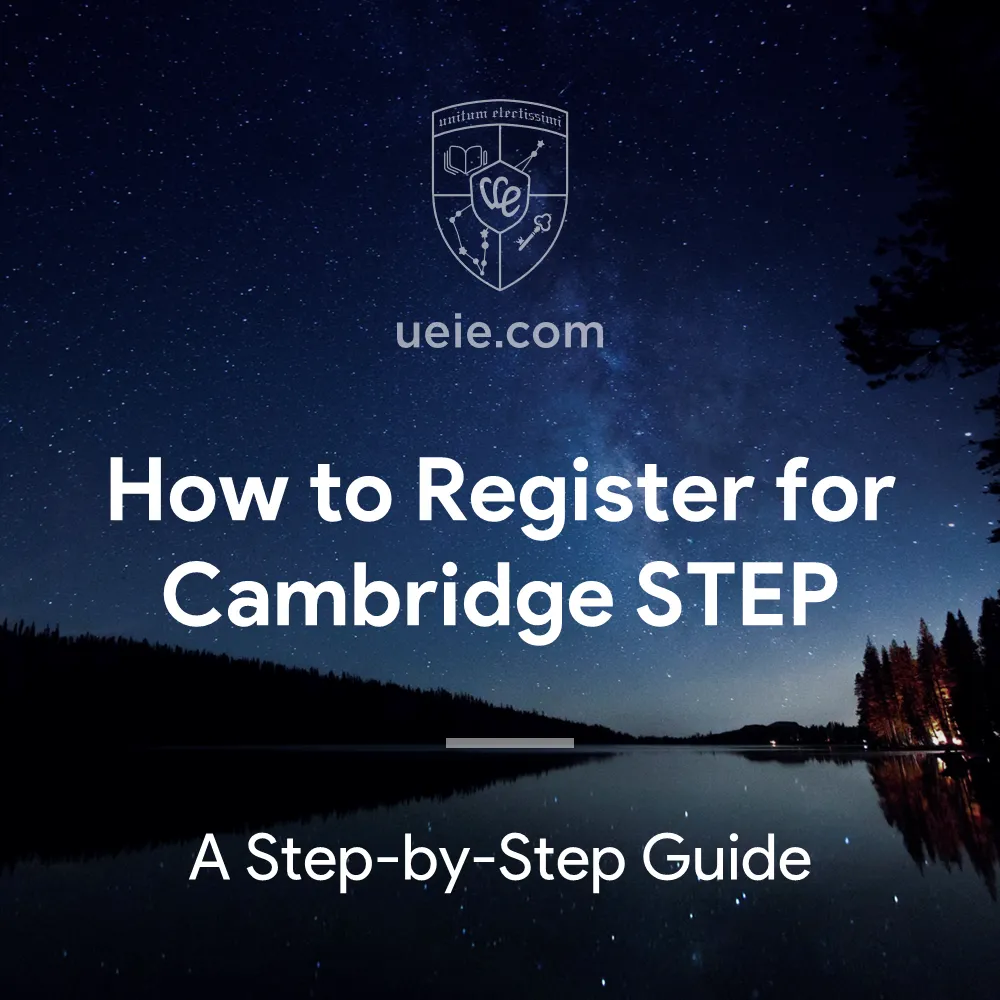
How to Register for Cambridge STEP
Mastering math is a must for aspiring mathematicians, and the STEP exam is a key hurdle for securing a spot at top universities like Oxford and Cambridge. Wondering when to register and how to navigate the process? This blog post will equip you with all the essential information for registering for the Cambridge STEP exam.
I. Key dates for Cambridge STEP 2025
STEP Registration Opens 1 March 2025 STEP Registration Closes 4 May 2025 STEP 2 Test Date 11 June 2025 STEP 3 Test Date 16 June 2025 STEP Results Released 14 August 2025 II. How to register for Cambridge STEP?
1. Foreign students (except China)
Find an approved test center to register for Cambridge STEP:
- You must take the test at a centre that is authorised to run STEP. Check if your school is authorised to administer the STEP exam on the OCR official website.
- If your school is not authorised, locate the nearest authorised open test centre where you can take the test through the OCR website.
Registration requirements:
- Name, gender, date of birth, and UCAS ID.
- The chosen university/ies, course/s and course code/s.
- If you require special care for physical reasons, you must submit relevant supporting documents together.
Candidate entry number:
Please ask the exams officer at your school/college/test centre to register you and give you your candidate entry number as proof that your registration is complete.
2. Chinese students
Option 1: Authorised test center at school to register for Cambridge STEP:
Follow the same steps as foreign students (except China) if we authorise your school.
Option 2: British Council Online Registration:
- Access the British Council Website: Use Chrome or Firefox browsers.
- Log in or sign up:
- Existing users: Log in using a verification code or password.
- New users (18+): Register for an account. (Note: Requires a Chinese mobile phone number.)
- Minors (under 18): A guardian must register and log in on your behalf. After registration, add an email address in “My Account” for receiving exam notifications.
- Select Exam Type: Choose “University Admission Test” and the STEP paper(s) you wish to take (Paper 2 or 3).
- Review and Confirm Exam Details: Test center, date, price, etc.
- Fill Out Personal Information: Include guardian information if applicable.
- Provide Exam Information: UCAS ID, applied university, UCAS course code, and any special arrangements needed.
- Select Leaving Type.
- Confirm Booking and Payment.
- Print Exam Confirmation Letter.
III. UCAS ID
1. What is a UCAS ID and how do I find it?
The Universities and Colleges Admissions Service (UCAS) assigns a 10-digit Personal ID Number to each applicant. This number is essential for linking your Cambridge STEP results to your university application.
To find your UCAS ID:
- Log in to your UCAS account.
- Click on your avatar in the upper right corner to access “Your Hub.”
- Click “Start Application” and select the relevant admissions year.
- Your UCAS ID will be displayed on the right-hand side of the page.
2. Using your UCAS ID for Cambridge STEP Registration
- Registering a Year Early: If you are registering STEP exam a year earlier and you have not yet submitted your university application, please check with your chosen university if they will accept a result from a test taken a year earlier than needed. Please note, for above candidates, you will be responsible for providing the result to the relevant university.
- Results Not Required by Universities: If you do not need your STEP results sent directly to universities (e.g., you’re taking the exam for personal enrichment or practice), you can enter all zeros (000-000-0000) in the UCAS ID field during registration. This will be considered as no UCAS ID needed for your exam application.
IV. Access arrangements
If you require special arrangements, select “yes” during registration and specify the needed arrangements with supporting documentation (school/doctor’s note) in Step 6 when registering for Cambridge STEP exam.
Please notice that requests for modified papers must be received by noon 12:00 (China Local Time) on 21st April 2025. The detailed supporting documents need to be scanned and emailed to our centre. British Council Global Exams Services National service hotline (Email: Globalexams.China@britishcouncil.org.cn, Tel: 010-58103306).
The types of access arrangements are as follows:
- 25% extra time
- Supervised breaks
- Separate Invigilation
- Use of colour overlays
- Use of a Reader
- Question paper enlarged to A3
- Use of an Amanuensis
- Other (please give detail of required facilities or other modifications)
V. Exam cancellation
- Before Registration Cut-off Date: Request cancellation for a partial refund of the local test service fee (after deduction of an administration fee of 30% local test service fee). The refund of board fee (if applicable) is subject to exam board’s policy.
- After Registration Cut-off Date: Cancellations are only allowed under exceptional circumstances (e.g., medical reasons) with supporting evidence submitted before the test day.
- No cancellations are accepted after the test day.
VI. Conclusions
The STEP examination is one of the key factors influencing whether candidates applying for Mathematics-related courses at universities such as Cambridge, Warwick, and Imperial College receive an offer. Therefore, understanding the STEP registration process is crucial.
So, how is your STEP preparation progressing? Click the image link below to explore related articles from us offering a comprehensive explanation of the Cambridge STEP exams and preparation guides. This can enhance your study efficiency and effectively boost your STEP results!
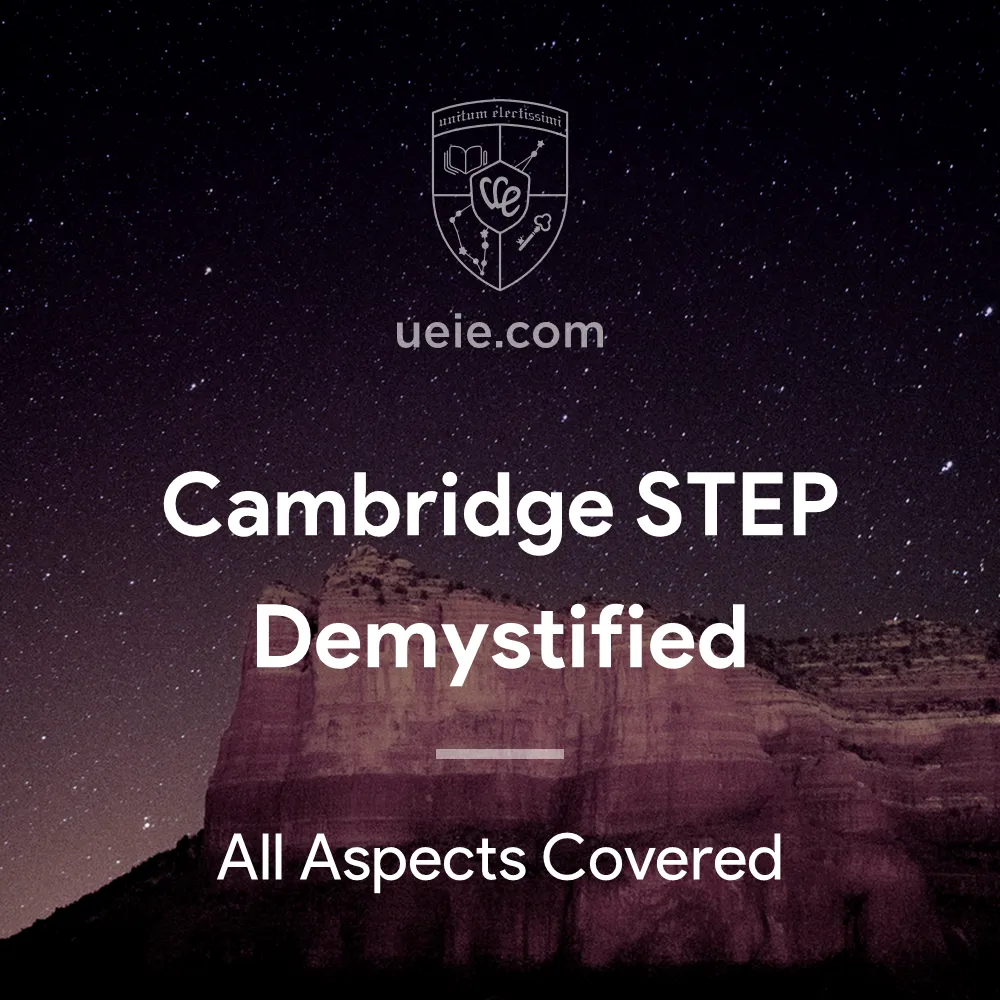
Cambridge STEP Demystified: All Aspects Covered
Get a complete overview of the Cambridge STEP exam, crucial for Cambridge Maths. This guide covers all aspects: syllabus (A-Level Maths & Further Maths), paper-based format (choose 6 from 12), scoring (S-U grades), university requirements, and key preparation resources.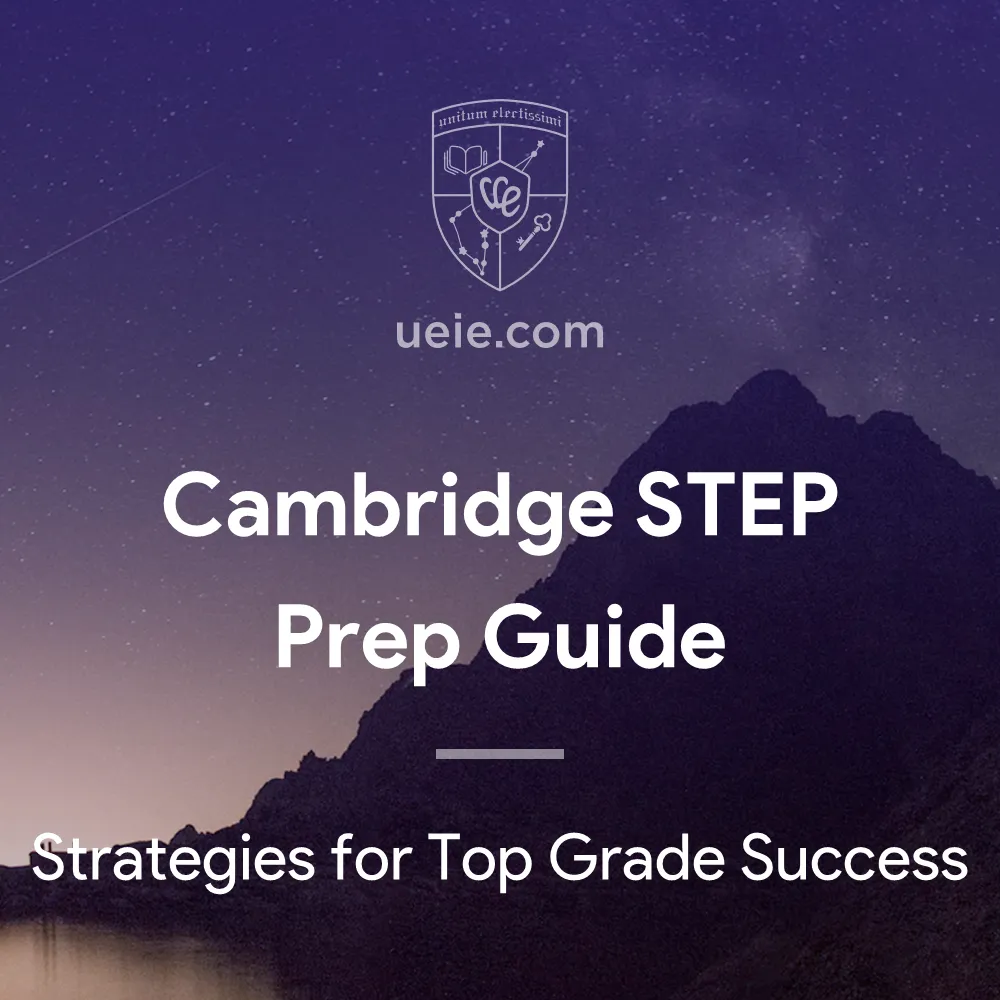
Cambridge STEP Preparation Guide: Strategies for Top Grade Success
Achieve top grades (1 or S) in the challenging Cambridge STEP exam. This masterclass guide details effective preparation strategies, essential skills development (calculation, proof, problem-solving), Further Maths integration, resource management, and effective time planning. -

Beyond the Offer: 8 Oxbridge Successes and Reflections on the Journey 2025
Eight students I mentored for their Oxbridge admissions tests triumphed in the fiercely competitive 2025 application round, winning places at these world-leading universities. Coming from diverse academic backgrounds, their strengths lay in mathematics, the sciences, economics, and engineering. But their shared traits were dedication and a touch of good fortune. This article traces their success journeys. It explores their key strategies. Lessons learned are also reflected. This aims to guide future applicants.
I. Case Studies and Analysis
1. Oxford Mathematics – Two Offers
Student A was from Beijing, while Student B attended a private school in the UK.
Unlike most math applicants I mentored, A and B had average profiles. They skipped systematic math competition prep. Their STEP results were only grades 1-2. Such achievements seem less impressive. Many top candidates win multiple competitions. They also achieve double S grades in STEP.
When it came to preparing for the TMUA and the Oxford MAT, Student A showed exceptional aptitude. He mastered the material in just 20 hours—others need 40-60 hours. His scores proved excellent: 8.9 on TMUA and 91 on Oxford MAT.
Student B, on the other hand, was incredibly diligent, full of ideas, and a highly effective independent learner. After my initial guidance, she could work independently. She used my test prep materials effectively on her own. My observation, however, was that B wasn’t a natural test-taker, although she was very articulate. Though her TMUA/MAT scores weren’t strong, she excelled in the interview. She impressed Oxford’s interviewers and won a math offer.
2. Oxford Physics – One Offer
Student C hailed from Nanjing.
C’s physics passion and academic strength were notable. But their mother’s commitment amazed me most. Long-term follower of my public account, she had previously purchased my BPhO materials. After thorough research on my PAT resources, she even pre-booked private lessons—six months before the updated course release.This was before I released the updated PAT course.
My advice for highly motivated and independent learners like C is that a combination of video lessons and interactive support offers the best value. This approach was ideally suited to C. After diligently working through the PAT video course, I provided ten hours of targeted one-to-one tuition, specifically addressing their mathematical and physics weaknesses. Thanks to C’s effective learning with the video material and their excellent preparation for our sessions, our lessons were incredibly productive. In fact, we covered all the necessary content, and a few tutorial hours remained.
Much to my surprise, C’s mother opted to use these remaining hours for mock exam papers rather than requesting a refund. At this point, I hadn’t even announced the mock exams, so this vote of confidence put me under pressure. I knew the quality of these practice papers simply had to be top-notch to justify her trust. Once the mock papers were finalised and released, C diligently worked through each one before the exam, regularly discussing any tricky questions with me.
In the end, C achieved ESAT scores of 9, 8.6, and 8.3, and a PAT score of 87, consistent with their performance on the mock exams. Their interview was also strong and steady, resulting in a well-deserved offer to study Physics at Oxford.
3. Oxford Engineering – One Offer
Student D came from Beijing.
To other students, D’s talent seemed unattainable: he learned quickly and effortlessly, racking up awards in various international competitions. I began working with D as he prepared for the Cambridge STEP. He had already qualified for the AIME and had a dedicated mathematics competition coach, so I was initially puzzled as to why he needed my STEP tutoring. His father, however, was extremely modest, explaining that he simply wanted his son to benefit from the guidance of more experienced teachers. I subsequently worked with D right through to the ESAT and PAT exams, culminating in all-English coaching for his engineering interview.
Two years previously, I had tutored a British student for the PAT and their engineering interview, which resulted in an Oxford Engineering offer. This prior experience provided a useful benchmark when conducting D’s all-English mock interviews. D surpassed the British student I had previously coached in every way: reaction speed, fluency in English, and the depth of his thinking were all on another level.
D’s PAT score of 95 (putting him in the top 5% globally) was entirely expected, and the interview proved to be a mere formality. His offer to study Engineering at Oxford was richly deserved.
4. Cambridge Economics – One Offer
Student E came from Guangdong province.
Another exceptionally bright student, he was applying a year early. From our very first session, I realised E was different. His logical reasoning and speed of calculation were in the top 0.1%, on par with Student A, but he was also more prone to errors. This meant his exam scores didn’t always reflect his true ability. The biggest challenge for E, therefore, wasn’t mastering new mathematical concepts or exam technique in a short time frame, but ensuring he could perform consistently under pressure.
Through our tutoring sessions, and in discussions with his parents and teachers, it became clear that E’s performance was easily affected by his emotional state. Once I was confident he had the knowledge and exam skills, I shifted the focus of our sessions towards managing emotions and building resilience.
Although E’s TMUA score was slightly lower than A’s, it was more than sufficient for Economics. I had no doubt that once he reached the interview stage, he would make a strong impression. Sure enough, he secured an offer from Cambridge to study Economics.
5. Cambridge Natural Sciences – Three Offers
Students F, G, and H were all from the same school and applied for Natural Sciences (Biological).
Two of them had already started attending my classes the previous winter. At that point, the ESAT syllabus had just been released, and nobody was quite sure how difficult each section would be. What we did know was that they would need to maintain their strength in one or two of the sciences (physics, chemistry, or biology) while also improving their mathematical thinking and exam technique to ensure a strong score in Mathematics 1 – high enough not to jeopardise their overall application.
In the early stages of the course, they studied core mathematical concepts alongside students applying for Mathematics, Computer Science, Engineering, and Economics. Their marks on the regular maths assignments tended to be in the mid-to-lower range. I regularly offered them encouragement, acknowledging the progress they were making in maths. However, within that high-achieving group, everyone was improving so rapidly that they sometimes felt their own progress was less significant.
It wasn’t until the intensive revision period, when some new students joined the class, that they truly appreciated the progress they’d made and the advantages gained from their earlier hard work, as their mock exam scores started to reflect it.
I don’t teach chemistry or biology myself. According to feedback from Gong Jin, the teacher responsible for those subjects, all three students showed real talent in their chosen scientific fields. In general, they were diligent and dedicated, with clear strengths in their respective sciences, but slightly weaker in mathematics. Their success, perhaps, makes their achievements even more relatable to other students.
II. Success Factors and Reflections
These eight students, despite their diverse academic backgrounds and application journeys, did not achieve success by chance. Their accomplishments were the culmination of a multitude of factors working in harmony.
1. Student-Specific Factors
- A Solid Academic Foundation is Essential
The selection criteria at Oxbridge are incredibly demanding. A strong academic foundation is the first key to unlocking the door. All eight students demonstrated a solid grasp of their chosen subjects and a high level of academic ability.
- A Proactive Approach to Learning is Crucial
These students didn’t rely solely on my guidance. They actively engaged with their studies, independently explored topics, readily sought clarification when needed, and maintained a thirst for knowledge and a spirit of intellectual curiosity.
- A Positive Mindset is Vital
The application process is long and challenging, making a positive mindset essential. Throughout their preparation and application, these students effectively managed stress, maintained confidence and optimism, and ultimately performed consistently well in both the written tests and interviews.
- Excellent Exam Technique is Key
Top marks in the admissions tests are a prerequisite for Oxbridge applications. All eight students possessed outstanding exam technique, enabling them to consistently perform well and achieve excellent scores.
2. Teacher Guidance
- Targeted Tuition for Admissions Tests
I tailor my approach to each student’s individual needs and academic background, creating personalised preparation plans. This involves systematically explaining key concepts, providing in-depth analysis of past papers, and strengthening exam technique, ultimately helping students achieve high scores in the admissions tests. For instance, with students A, D, and E, who possess natural talent and learn quickly, I focus on encouraging deeper understanding and challenging them with more advanced concepts. For students B, C, F, and G, I emphasise consolidating foundational knowledge and honing exam skills, helping them address areas of weakness.
- Comprehensive Interview Preparation
The interview is a crucial element of the Oxbridge selection process. Through mock interviews, question analysis, and coaching on effective communication, I familiarise students with the format, equip them with effective strategies, and enhance their interview performance. For example, I conducted all-English mock interviews with Student D and provided tailored feedback on his strengths and areas for improvement.
- Supportive Teacher-Student Relationships
The application journey is fraught with stress and anxiety. I strive to be not only a teacher but also a supportive mentor, offering a listening ear, encouragement, and strategies for maintaining a positive outlook.
3. Family and School
- Family Support
Understanding, support, and encouragement from parents are vital motivating factors in students’ Oxbridge applications. All eight students benefited from the unwavering trust and support of their parents, who created conducive learning environments.
- School Resources
A school’s provision of high-quality academic resources and all-round support plays a significant role in successful Oxbridge applications. While my primary role was to provide admissions test tuition for students at a partner school, I also witnessed the school’s considerable investment in application guidance, interview practice, and extracurricular enrichment. The school’s impressive track record of Oxbridge offers in recent years, garnering national attention, is testament to this commitment.
4. Reflection and Future Development
- Collaboration with Other Teachers
When it comes to university guidance and interview preparation, I recognise the importance of collaboration. Several students with top admissions test scores either failed to secure interviews or were unsuccessful after interview. Analysis suggests the issues may lie in the personal statement or the interview performance itself. In the future, beyond maintaining my rigorous focus on admissions test preparation, I will strengthen communication and collaboration with teachers involved in other areas of the application process, striving to provide more holistic support to students, and ultimately increase their chances of success.
- Emphasis on Wellbeing
The application process is highly pressurised, and it’s common for students, and sometimes even parents, to experience anxiety. It’s important to remember that parental anxiety can subtly influence students. Going forward, I will place greater emphasis on the wellbeing of both students and parents. Alongside encouraging students, I will prioritise communication with parents, offering support and strategies for managing stress, thus fostering a positive and healthy environment for preparing applications.
- Developing Future-Focused Resources
During the intensive revision period, the quantity and quality of practice resources are paramount. While my students have access to ample resources, to better cater to their individual needs, I will continue to explore, develop, and refine targeted practice materials and maintain their high quality.
III. Advice for Students and Parents
- Plan Early and Set Clear Goals
The competition for Oxbridge places is fierce, so early planning and preparation are crucial. Students should identify their areas of interest and academic strengths as soon as possible and create a detailed study plan. - Build a Strong Foundation and Develop Holistically
Academic excellence is fundamental to Oxbridge applications, but a well-rounded profile is equally important. Students should focus on building a strong foundation of knowledge while actively participating in extracurricular activities, cultivating hobbies, and developing their all-round abilities. - Prioritise Admissions Tests and Exam Technique
The admissions tests are a critical component of the Oxbridge application process and require dedicated preparation. Students should familiarise themselves with the test format and content, master problem-solving techniques, and develop effective strategies. - Craft Compelling Personal Statements that Showcase Individuality
The personal statement is a vital platform for students to express their unique personality, strengths, and aspirations. They should reflect deeply on their experiences and talents to produce authentic, engaging, and impactful statements. - Prepare Thoroughly for Interviews and Shine
Interviews are a key part of the Oxbridge selection process. Students should research the interview format and potential questions, prepare answers, and participate in mock interviews to enhance their communication and problem-solving skills. - Maintain a Positive Mindset and Embrace Challenges
The application journey is demanding, and maintaining a positive mindset is crucial. Students should believe in themselves and proactively address any challenges they encounter. - Parental Support: A Catalyst for Growth
Parental support and encouragement are invaluable to students aspiring to Oxbridge. Parents should provide unwavering trust and support, fostering a positive learning environment and offering emotional support.
IV. Conclusion
The success of these eight students is a testament to their own hard work, the guidance of their teachers, the support of their families, and the resources provided by their schools. Their experiences offer valuable insights and inspiration for others. I hope this analysis will serve as a guide for aspiring Oxbridge applicants, helping them to realise their academic ambitions.
Explore more preparation resources and posts:
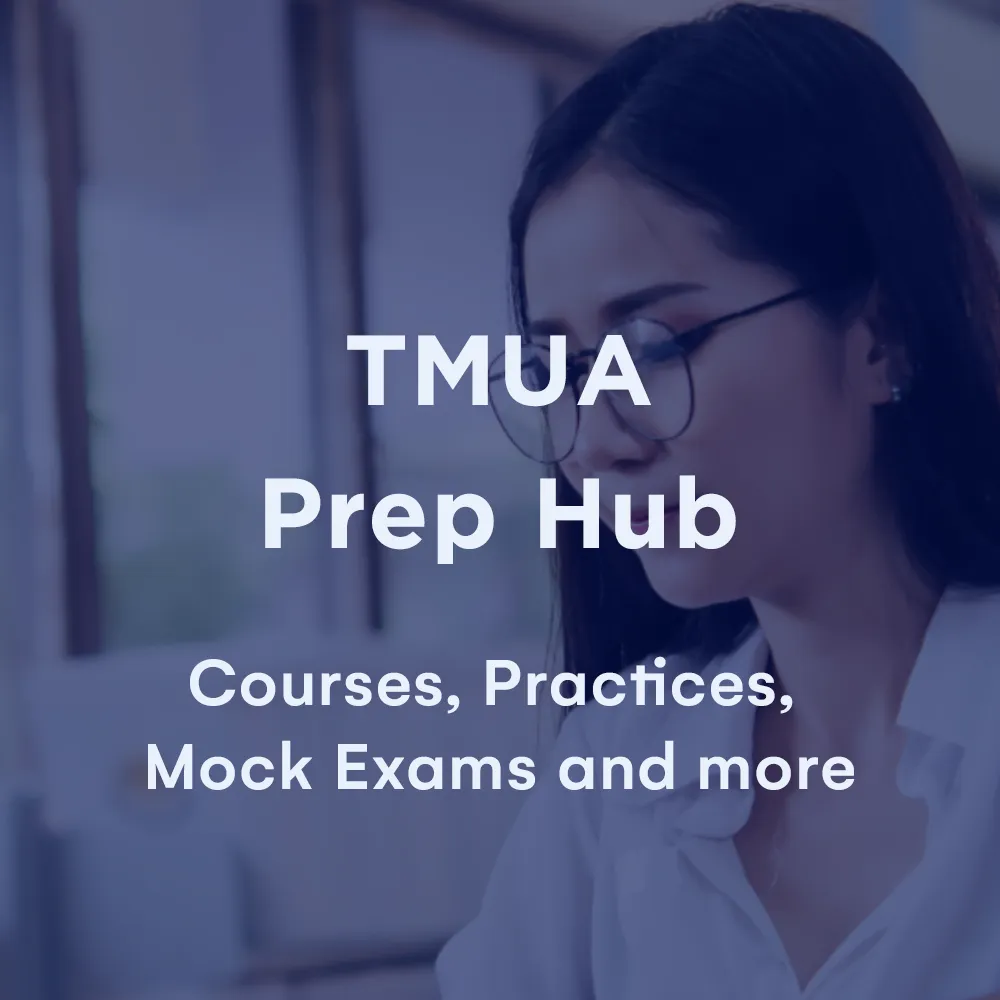
TMUA Prep Hub
Master the TMUA with UEIE’s Prep Hub! We offer everything you need to succeed: in-depth video lecture series, extensive practice question bank, realistic full-length mock exams, expert guides, and insightful data analysis.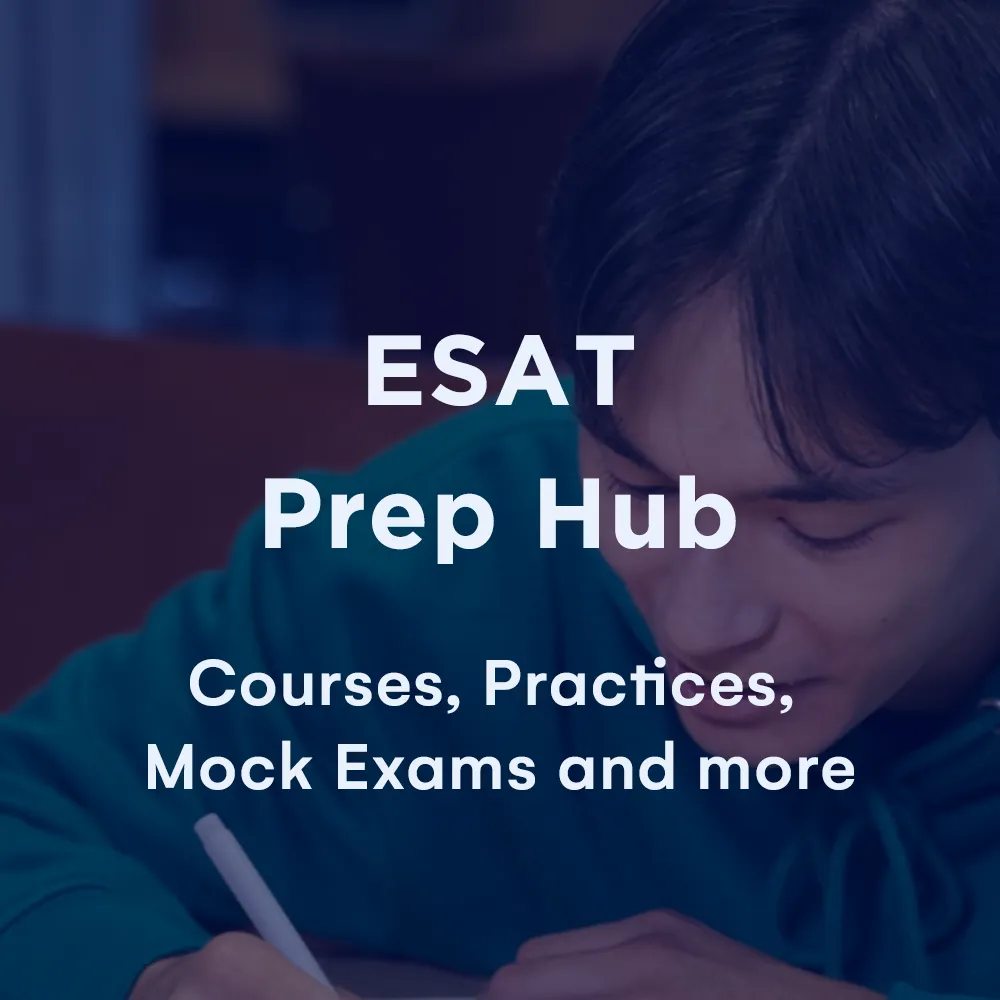
ESAT Prep Hub
Master the ESAT with UEIE’s Prep Hub! We offer everything you need to succeed: in-depth video lecture series, extensive practice question bank, realistic full-length mock exams, expert guides, and insightful data analysis.
Cambridge STEP Prep Hub
Master the Cambridge STEP with UEIE’s Prep Hub! We offer everything you need to succeed: in-depth video lecture series, extensive practice question bank, expert guides, and insightful data analysis. - A Solid Academic Foundation is Essential